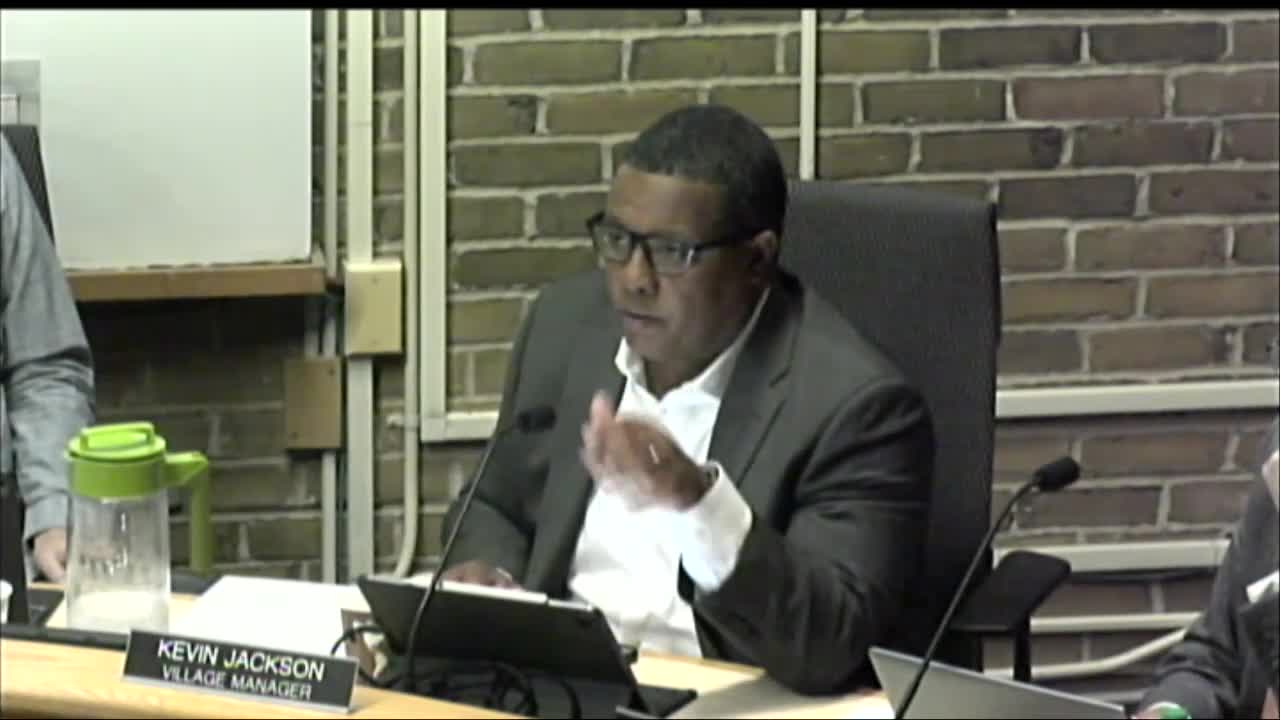Oak Park staff outlines expanded business assistance grants including climate-ready and fire-safety options
September 30, 2025 | Oak Park, Cook County, Illinois
This article was created by AI summarizing key points discussed. AI makes mistakes, so for full details and context, please refer to the video of the full meeting. Please report any errors so we can fix them. Report an error »

Village staff presented a study-session proposal to expand Oak Park’s business-assistance grants for fiscal 2026. The village currently runs a commercial façade improvement program; staff proposed three additional grant types: an interior-facade program, a climate-ready business grant and a fire-safety grant, and sought trustees’ policy direction.
Nomi Diaz, administrative officer, explained the proposed structure: exterior façade grants would remain (50% reimbursement, up to $5,000 per retail space); a mirror interior-facade grant would match that structure and be restricted to first-floor sales-tax-generating businesses (minimum $500, maximum $5,000); a climate-ready grant (50% reimbursement, $1,000–$6,000) would support energy-efficiency, EV chargers, solar and zero-waste initiatives and would require benchmarking compliance for buildings 10,000 square feet and larger; and a fire-safety grant (50% reimbursement, $500–$3,500) would help businesses install or upgrade fire alarms and sprinkler systems.
Trustees asked whether grants can be stacked (staff said yes within a calendar year), whether benchmarking should be required across programs (staff noted benchmarking is already required for larger buildings and trustees favored using that as a threshold), and whether HVAC improvements funded under interior grants should be required to be electric or otherwise align with village electrification goals. Staff said projects must meet code and that the board could add grant conditions to promote electrification. Trustees and staff discussed outreach to ensure equitable access for women- and minority-owned businesses and noted potential underutilization of the current program (historically roughly 4–5 awards per year, with approximately $50,000 annual budgeted for façade grants).
Staff said the Office of Economic Vitality will help with marketing and one-on-one outreach, and that staff will return with detailed grant guidelines, benchmarking requirements and recommended budget adjustments. Trustees requested additional business-survey information to calibrate grant levels so awards catalyze private investment rather than subsidize marginal projects.
No vote was required at the study session; staff will return with final guidelines and any budget amendments for board approval.
Nomi Diaz, administrative officer, explained the proposed structure: exterior façade grants would remain (50% reimbursement, up to $5,000 per retail space); a mirror interior-facade grant would match that structure and be restricted to first-floor sales-tax-generating businesses (minimum $500, maximum $5,000); a climate-ready grant (50% reimbursement, $1,000–$6,000) would support energy-efficiency, EV chargers, solar and zero-waste initiatives and would require benchmarking compliance for buildings 10,000 square feet and larger; and a fire-safety grant (50% reimbursement, $500–$3,500) would help businesses install or upgrade fire alarms and sprinkler systems.
Trustees asked whether grants can be stacked (staff said yes within a calendar year), whether benchmarking should be required across programs (staff noted benchmarking is already required for larger buildings and trustees favored using that as a threshold), and whether HVAC improvements funded under interior grants should be required to be electric or otherwise align with village electrification goals. Staff said projects must meet code and that the board could add grant conditions to promote electrification. Trustees and staff discussed outreach to ensure equitable access for women- and minority-owned businesses and noted potential underutilization of the current program (historically roughly 4–5 awards per year, with approximately $50,000 annual budgeted for façade grants).
Staff said the Office of Economic Vitality will help with marketing and one-on-one outreach, and that staff will return with detailed grant guidelines, benchmarking requirements and recommended budget adjustments. Trustees requested additional business-survey information to calibrate grant levels so awards catalyze private investment rather than subsidize marginal projects.
No vote was required at the study session; staff will return with final guidelines and any budget amendments for board approval.
View full meeting
This article is based on a recent meeting—watch the full video and explore the complete transcript for deeper insights into the discussion.
View full meeting
